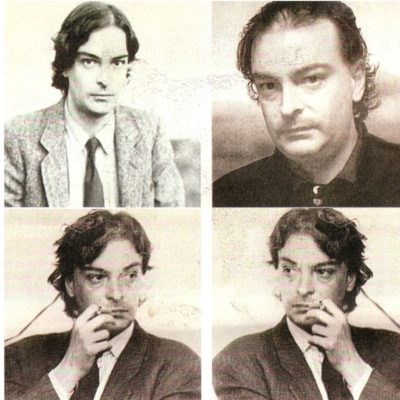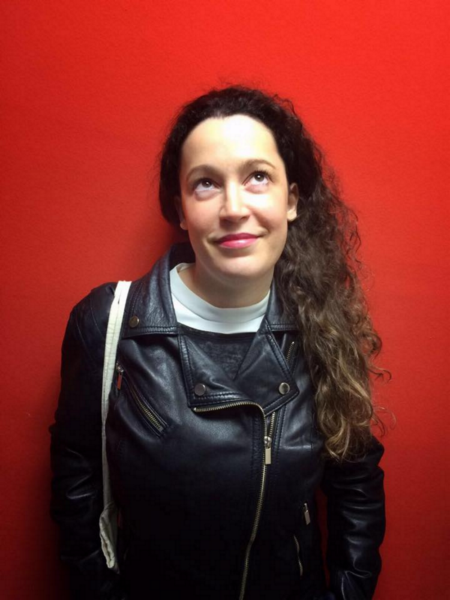Search
To search for an exact match, type the word or phrase you want in quotation marks.
A*DESK has been offering since 2002 contents about criticism and contemporary art. A*DESK has become consolidated thanks to all those who have believed in the project, all those who have followed us, debating, participating and collaborating. Many people have collaborated with A*DESK, and continue to do so. Their efforts, knowledge and belief in the project are what make it grow internationally. At A*DESK we have also generated work for over one hundred professionals in culture, from small collaborations with reviews and classes, to more prolonged and intense collaborations.
At A*DESK we believe in the need for free and universal access to culture and knowledge. We want to carry on being independent, remaining open to more ideas and opinions. If you believe in A*DESK, we need your backing to be able to continue. You can now participate in the project by supporting it. You can choose how much you want to contribute to the project.
You can decide how much you want to bring to the project.

‘What if imposture were a way of appropriating ourselves of places, which isn’t a bad thing?,’ asked Jean Echenoz after listening to Enrique Vila-Matas recalling their first meeting at an ephemeral, short-lived bar called El aviador. Echenoz doesn’t deny the story told by the writer from Barcelona; he remembers the bar in which ‘under a glass top, the counter displayed the reconstruction of a miniature airfield’, but what if he were to deny it? ‘It could appear to be an imposture, especially if you were now to deny it and say you don’t remember El aviador, but you won’t. You wouldn’t dare, would you?,’ the author of Bartleby y compañía asked Echenoz somewhat nervously. What if that memory didn’t live on in the French author and were simply another of those memories made up by Vila-Matas? At the end of the day, aren’t all memories really a form of invention? But in that case, where would the imposture lie? In those memories that can only be inventions of those who remember? In the bar whose existence is as doubtful as the event that is remembered? Or in the gesture thanks to which the two authors appropriate themselves of a space, a place that regardless of whether it actually existed or not they have made into the setting of a first encounter that no one can guarantee occurred precisely as they say it did?
According to the Royal Academy of the Spanish Language (RAE, for its initials in Spanish), imposture is a ‘false and malicious imputation’ or a ‘pretence or deceit that has the appearance of truth’. Yet both definitions reveal themselves to be insufficient when it comes to thinking of imposture in the field of art and, specifically, in the field of literature, as it wouldn’t only force us to assume the existence of an objectifiable truth to which we oppose creation, but also that creation itself, insofar as it is fiction, is equivalent to a lie, complete nonsense. ‘You speak of “imposture” but I don’t think that, in the case of borrowing a sentence, this is the right word. Imposture – and, above all, the feeling of imposture – is something else. Here we’re talking about our actual work: capturing, stealing, seizing, diverting, shattering our perception of the world and rearranging the pieces in order to try and offer a reconstructed image of that world,’ says Vila-Matas to Echenoz, thereby raising new questions. So is it wrong to define imposture as the mere gesture of “capturing, stealing, seizing, diverting, shattering our perception of the world”? If imposture were no more than the ‘actual work’ of authors, could any artistic gesture escape the possibility of being defined as imposture? No, because all creative exercises are always exercises in re-appropriation, in the construction of a possible world that, following the logic of fictionalisation, strays from the alleged co-fiction we call reality. In this sense, there is no greater imposture than the realistic will to appropriate oneself of the ‘real’ image of the world in order to represent it. I remember reading that Rodrigo Fresán once said ‘I think reality is overvalued,’ but what is truly overvalued isn’t reality itself, but ‘realism misunderstood’, that blind conviction in the existence of a definable and identifiable exterior reality that can even be reproduced. ‘Everything that crosses the threshold of truth is fiction, whether or not the crossing is verisimilar. In fact, since the great literary imposture of Don Quixote, we can go even further and say that fiction isn’t only what appears to be true but isn’t, but especially what mocks truth and denies it,’ said critic Jordi Llovet in 1984 after reading Vila-Matas’s article entitled ‘Lo verosímil como impostura’, in which he outlined the poetics of imposture that over the decades have defined the oeuvre of the writer from Barcelona. But let’s not advance events.
‘Rhetoric,’ wrote Paul de Man in Semiology and Rhetoric, ‘radically suspends logic and opens up vertiginous possibilities of referential aberration,’ and it is this aberration, this distortion of the self and of any possible exterior reality that defines writing and doesn’t only challenge the most innocent – and the less innocent – realism but also makes us ask ourselves again what we understand by imposture. Couldn’t it be writing’s awareness of itself that is revealed as a referential aberration? ‘Am I a lecture or a novel? Am I? Suddenly, everything is a question. Am I someone? What am I? Do I look like Hemingway, or am I nothing like him?,’ wonders the narrator of Never Any End to Paris, highlighting in Pirandello-like fashion not only the non-coincidence between what one wants to be, aspires to be or believes to be, and what others see in him – ‘From the looks on your faces, esteemed audience, it seems you share the opinion of my wife and friends. You’re of that same tendency, just like the organisers in Key West. I don’t know why, but it feels as though you’re disqualifying me too’ – but also the impossibility of coming up with an answer to these questions. ‘It would be a referential aberration!,’ I can see myself shouting at Paul de Man before the narrator’s only seemingly naïve reply: ‘I, however, need to believe that every day I look more like the idol of my Parisian years.’ There is little innocence behind these words: Vila-Matas’s narrator knows as well as his maker that identity can only be formulated as a desideratum, that to assert oneself as Hemingway’s double is as fallacious as defining oneself as ‘I’, as ‘a novel’ or as ‘an essay’. To be, what does it mean to be? To be what? — these questions posed by the narrator in Never Any End to Paris but also by the text itself – to be a lecture or a novel? – revealing even further, if conceivable, the impossibility of precision, an impossibility present in Vila-Matas’s earliest works or at least since the publication of the novel with the programmatic title Imposture.
In that 1984 article, Llovet upheld that what is most interesting about this novel of shameless title isn’t the repeated motif of the impossible identity ‘but its highly intelligent organisation as the actual motif of literature and of the position of the author in the bosom of the literary process’, as ‘Vila-Matas hasn’t only practiced evil in the field of the dismantling of fiction but has taken the terror of analysis to the very heart of personality’. Through the character of a mental patient who is absent-minded and doesn’t know who he is, identified by Mrs Bruch as Ramon Bruch, a Falangist writer who collaborated with the Blue Division described by Claudio Nart as an anarchist and extortioner, Vila-Matas doesn’t only deconstruct the idea of identity but also the very idea of fiction or, to be more precise, the idea of a fictional identity capable of governing the possible world of fiction. The questions posed by the narrator and the text of Never Any End to Paris were already present in Imposture, the very title of which highlights the imposture found in the crystallisation of identities. As is patently clear in Mac and His Problem, the crystallisation is impossible for it is trapped within a dialectical movement between repetition and difference — difference being the slight deviation from a continuous repetition. ‘Once the party is over, all that is left to the reader is to establish and expand the production of fiction: to invent a possible persona for the writer himself,’ wrote Llovet. This possible persona cannot escape the expansion of the production of fiction summed up in the words once pronounced by someone whom I can’t quite place (Vila-Matas?, A. G. Porta?, a fictional character?, I myself?): ‘I’m Vila-Matas, like everyone else.’
In Intento de escapada, the artist Jacobo Montes – envisaged by Miguel Ángel Hernández, a writer from Murcia – tried to erase the distance between art and life and transform his performance about the drama of refugees into the actual reality rather than into a representation. Hernández doesn’t only question the ethical nature of the gesture, but the blurring of the limit between reality and copy that would allow the copy to assert itself as ‘raw reality’ rather than as a copy or a representation. In his turn, Vila-Matas goes one step further and doesn’t only question the status of reality and the distance that separates it from all works of art thanks to its fictional status, but questions fiction itself — the murderess, according to Llovet. There is no fiction per se, only a continuous fictional reinvention of all fiction; i.e., a continuous movement of repetition and deviation from fiction, that is never either first or last, that never quite crystallises, as that is precisely where imposture lies, in that crystallisation: ‘Modern fiction is not obliged … to strike any kind of balance, on the contrary,’ upheld Llovet, and this is what Vila-Matas does, posing the most unsolvable of paradoxes: imposture is to expect a balance, a strange reference within or without the fictional framework, but it is also that which defines literature itself: ‘To always believe in one single theory would be totally suicidal and also slightly stupid because for someone as shy as I am nothing could be as foolish as thinking that precisely one’s own theory was valid,’ states the narrator in Perder teorías. Like him, instead of clinging to just one theory, Vila-Matas loses them, and losing theories is a way of reinventing them, of escaping their reification or identification in that constant movement of repetition and difference that destroys the certainties of the reader and the certainties of the text itself, obliged – like the characters that inhabit the author’s world – to question itself and hence build for itself a fictitious identity the characters never quite discover. Literature is imposture insofar as it reveals its imposture. In other words, imposture is the awareness of this literature that knows itself to be a referential aberration.

Anna María Iglesia (1986) holds degrees in Italian Philology, Theory of Literature and Comparative Literature, and a Ph.D. awarded by the University of Barcelona, where she presented her thesis ‘The Narrative of Urban Space and its Practices. Nineteenth-Century Paris and Flânerie’. A cultural journalist, she writes about literature and the world of publishing and is a regular contributor to The Objective, El Confidencial, Letra Global, Turia and La esfera de papel. Iglesia is chief editor of Librújula, where she is responsible for both the digital and the fortnightly paper editions. She also works as a professional reader for several publishing houses and her short essay La revolución de las flâneuses has just been published by Wunderkammer.
"A desk is a dangerous place from which to watch the world" (John Le Carré)